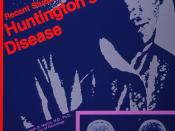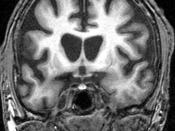Huntington's chorea, or Huntington's disease, named after Ohio physician George Huntington in 1872, is an inherited disorder characterized by abnormal body movements called chorea, and loss of memory. Chorea is an abnormal voluntary movement disorder, one of a group of neurological disorders called dyskinesias, which are caused by overactivity of the neurotransmitter dopamine in the areas of the brain that control movement. Chorea is characterized by brief, irregular contractions that are not repetitive or rhythmic, but appear to flow from one muscle to the next. The incidence is 5 to 8 per 100,000. Understanding and treating Huntington's chorea can help save countless lives and individuals.
A genetic disorder, or genetic disease, is a disease caused by abnormal expression of one or more genes in a person causing a distinct phenotype. There are a number of possible causes for genetic defects. They may be caused by a mutation in a gene, affecting its function.
There are genetic disorders caused by the abnormal chromosome number, Down syndrome and Klinefelter's syndrome. Defective genes are often inherited from the parents. In this case, the genetic disorder is known as a hereditary disease. This can often happen unexpectedly when two healthy carriers of a defective recessive gene reproduce, but can also happen when the defective gene is dominant. A number of genetic disorders are due to the change of a single gene, resulting in an enzyme or other protein not being produced or having altered functionality, called monogenic disorders. The change can be trivial and relatively harmless in its effects, such as color blindness, or lethal such as Tay-Sachs. Other disorders, though harmful to those afflicted with them, appear to offer some advantage to carriers. For example, carriers of sickle cell anemia appear to have enhanced resistance to malaria. Several hereditary diseases are sex-linked,


